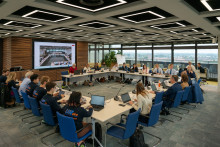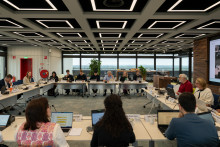That old sore is in so-called 'strategic personnel plans'. The University Council already asked for such plans per unit at the UT last summer. Despite repeated requests, the Executive Board did not come up with those plans. Last week too, the council and the Executive Board could not reach an agreement.
External HR-expert
The bottom line: the University Council wants to see that the UT is on track to meet financial challenges in the future. That is why such strategic personnel plans are crucial for the council; they should provide insight into how each unit at the UT will deal with the workforce in the coming years. After all, wage costs are the largest expenditure at the UT.
The Executive Board came up with a mea culpa because it took so long to come up with the plans. In the closed part of the meeting – which the press is not allowed to attend – this morning, the University Council already gained insight into the strategic personnel plans of two faculties and one service department. But such plans differ from each other. That is why the Executive Board wants to hire an external HR expert to 'harmonize' all plans. In the meantime, the University Council will receive a brief overview after the summer holidays. Most of the council eventually settled for that.
Procedural sore point
And then there was another – procedural – sore point: the University Council wondered what to do when a faculty council or service council comes up with a negative budget advice. Should the University Council, as central participation, go along with the advice of the decentral participation? Or form their own judgement independently of that?
The Executive Board acknowledged that dilemma. Vice-president Machteld Roos also pointed to the Higher Education and Research Act, Article 9.40. 'This means that if a faculty council and faculty board cannot reach an agreement, the Executive Board acts as a mediator. As the University Council, you may be aware, but you are not an actor. We want to emphasize that role clarity. You are there to advise and agree on the headlines of the budget.'
Alarm bells
That turned out to be a bit difficult for the University Council to swallow. In the words of staff council member Catalin Popa: 'We do not represent the faculty councils, but we do depend on the expertise of those councils. If there are warning signs there, we have to take such signals seriously. It concerns a lot of money, especially at faculties.' And referring to the difficult budget discussions over the past two years: 'We want to avoid a situation in which we have to vote on a total budget, while faculty councils advised negatively on their partial budget.'
After wrangling about who is responsible for what, University Council chairman Herbert Wormeester concluded that the roles would be reversed – and that everyone in the faculty and service councils should be aware of this: if you can't figure it out, go to the Executive Board first, not to the University Council.
And after long deliberation – last week an hour and a half and now again – the council agreed to the kaderbrief.






